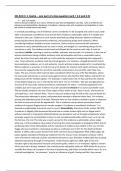Q5 AC2.3; 4 marks – one part of a big question (ac2.1 2.2 and 2.3)
• ac2.3 (4 marks)
need to discuss evidence as in court, reference case law and legislation (act etc), rules of evidence are
relevance and admissibility, disclosure of evidence, hearsay rules and exceptions and legislation in case
law (need to include some case laws)
In criminal proceedings, not all evidence can be considered. To be accepted and used in court, both
sides in prosecution and defence must ensure their evidence is admissible, where it is reliable and
relevant to the case. Evidence in court may be provided by calling witnesses (witness evidence);
producing documents (documentary evidence); and producing things (real evidence). When
considering evidence needed to ensure conviction, courts must be concerned with relevance
(relevant to case), admissibility (can be used in court), and weight (is it something that go far for
conviction or nah). For evidence to be heard and allowed by the court on each side, it must be
considered reliable, meaning it must be credible, authentic and accurate. For instance, in the case of
witness testimonies being credible, evidence must be believable and from a reasonable source,
where barristers from each side will try to dis-credit the witnesses in weakening their opponent's
case. To be authentic, evidence must be entirely genuine. For instance, a forged document cannot
be presented as evidence, as it is not authentic. Courts will also analyse evidence for its authenticity.
Where evidence is accurate, it must be true to its details, for instance with expert witnesses, where
they must be supported by the rest of the scientific community in any scientific claim they may
make. This was a factor which had not been considered within the case of Sir Roy Meadow, where
his inaccurate testimonies in several cases against women who had lost their babies, had led him to
being struck off the medical register. For example, in Sally Clarks trial, he had said that the chances
of two babies dying in a cot, in a family like hers were ‘one in 73 million.’ She was wrongly jailed on
account of his inaccurate statistical evidence, where given his status – testimony appeared to be
credible, but were inaccurate. Evidence must be considered relevant if it is to be used within court.
The law divides evidence into one of two types of facts within a trial: ‘facts in issue,’ also known as
‘principal facts,’ and ‘relevant facts.’ Facts in issue are matters that are left to the court to decide on.
The prosecution attempts to prove, and prosecution attempt to disprove these facts. For instance,
proving the defendant guilty of murder. Relevant facts are the evidence needed to prove or disprove
the facts in issue and cannot be argued with. This is evidence such as where prosecution found
evidence of suspects fingerprints on murder weapon. If evidence is considered ‘irrelevant,’ it is
deemed as inadmissible (cannot be used in court). Admissibility- Discretion Under section 78 PACE,
if evidence is illegally (like discovered by break law or violate human right such as illegal search
without warrant) or improperly obtained (where use deception such as through entrapments where
persuade suspect to commit/admit crime) it is not considered admissible within court, as it can risk
the fairness of a trial. The only way a court can permit this evidence as admissible, where judge
allow use, is if the probative value (value of proving the case) overweighs its prejudicial effect (risk of
producing unfair trial). Admissibility and the relevance of evidence was evident in the case of Colin
Stagg, who was involved in a honeytrap to allure a confession out of him for the death of Rachel
Nickell. In 1994, under power derived from both common law and legislation PACE 1084, judge, Mr
justice ognall, excluded all honeytrap evidence from the trial as it was ‘deceptive conduct,’ where
none of evidence collected could be considered relevant to case, therefore inadmissible due to being
obtained improperly through an entrapment. Under Human rights act 1998, right to fair trial
includes right to be presumed innocent until proven guilty, where it is in everyone's rights to remain
silent, pre-trial or during. However, the criminal justice and public order act 1004 allows for a jury to
consider the silence of a suspect in the face of questioning, and failure to testify within court. As, in a
criminal investigation, ‘no comment,’ may be an inference of guilt. Having said this, they cannot




